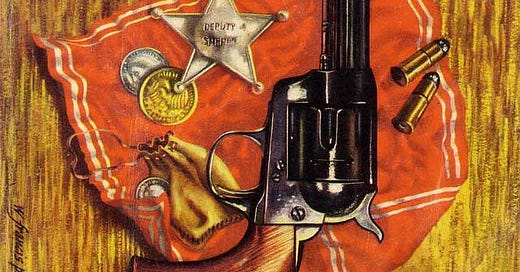Title: Warlock
Publication Year: 1958
Plot: Oakley Hall’s legendary Warlock revisits and reworks the traditional conventions of the Western to present a raw, funny, hypnotic, ultimately devastating picture of American unreality. First published in the 1950s, at the height of the McCarthy era, Warlock is not only one of the most original and entertaining of modern American novels but a lasting contribution to American fiction.
Miscellaneous: Writers Thomas Pynchon and Richard Fariña were especially fond of the novel, even dedicating what Pynchon called a "micro-cult" to it while students at Cornell University. Pynchon praised it for restoring "to the myth of Tombstone its full, mortal, blooded humanity", and for showing "that what is called society, with its law and order, is as frail, as precarious, as flesh and can be snuffed out and assimilated into the desert as easily as a corpse can. It is the deep sensitivity to abysses that makes Warlock one of our best American novels." Novelist Robert Stone was also reportedly a fan.
The group discussion leader didn’t waste any time getting our conversation started. “There are way too many characters in this book.” He turned to a few pages and read some selected paragraphs. As he read a character’s name, he would say which number character they were in that paragraph. He read one with 7 characters and we only knew 2 of them for sure. He said it was a little tiring to get through the novel because he was constantly wondering if he had encountered a character before. Or if he would encounter them again. Other readers agreed; they would stop and think if they knew who the character was and it would disrupt their flow.
Another reader acknowledged that too many characters bogged the novel down, but he also said it helped populate the small town of Warlock. In his mind, he could sense that people were always looking out their windows, snooping on each other, and spreading gossip. In a scene where Blaisdell enters a room, the reader could sense everyone’s eyes on him. He said he felt a similar feeling when he had his court hearing. “I could feel the eyes and hatred of everyone in that room, their looks burning into me.”
Speaking of disruptions, the reviews were mixed on the journal entries that are interspersed throughout the novel. Some though they got in the way. Others thought they provided a lot of good summary information. The fans of the journal entries better then Hall writing another 15 pages explaining things. Often times it’s a list of what’s happened. The rest of the book read like someone relaying what they heard and not like it is from someone that was actually there, at least according to 2 of the readers.
We thought the name of the town/novel was interesting. A warlock is essentially a male witch. This novel was written during their McCarthy era, a witch hunt of sorts. Is this a reference to the witch hunt in the ‘50s, or even the Salem Witch Trials? The readers thought it was most likely the case.
There were two elements our readers didn’t love. The first is there are virtually no horses talked about during the novel. In other novels we’ve read, we became more familiar with the horses of the characters. Not so much in Warlock. The readers also didn’t love that the mine strike didn’t amount to much. They expected it to be a key part of the finale or something. While it was some nice backdrop and characterization, the readers wanted it to play a bigger part in the story.
Yes, based on things I’ve summed up, you’d think the readers really didn’t like this novel. But I can’t tell you how many times they referenced scenes and laughed. They found a good sense of humor laced throughout the novel. They thought the novel was overly verbose but to a person, they all said they would read another book by Oakley Hall. So there you go.
We’re on to reading Close Range: Wyoming Stories by E. Annie Proulx. It’ll be nice to read some short stores. We hope you’re reading something good!
Until next time,
E.
If you’d like to read Warlock, here are some links:




